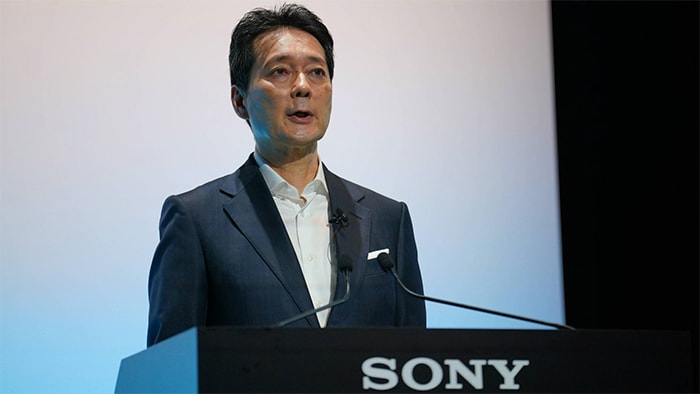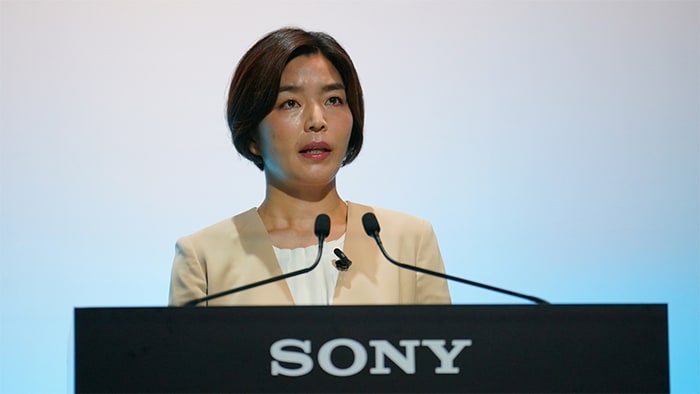Sony Holds “Sustainability Meeting”
Introduces Various Initiatives for Society and the Environment
Sony held the "FY2023 Sustainability Meeting" on September 14 at the Sony Group Head Office in Shinagawa. At this, the 6th annual meeting of its kind, the social significance of Kando (emotion), the initiatives to address global social and environment issues, and contribution to an inclusive society were introduced. The meeting was attended by media, investors and analysts, and was also streamed live.
You can watch the entire live streaming video on Sony’s Investor Relations website.
The Social Significance of “Kando”

Kenichiro Yoshida, Chairman and CEO of Sony Group Corporation, explained that Sony is committed to creating Kando and delivering it to the world based on its Purpose to "fill the world with emotion, through the power of creativity and technology." He also presented the social significance of Kando and stated, "Entertainment has the power to bring people together, rather than divide them."
He also expressed Sony's aims to support creators in many ways and to contribute to the realization of an inclusive society through technology as there is no limit to the creativity that generates Kando. "Together with our approximately 110,000 employees, we aim to continue to create social value in addition to the sustainable growth of the Sony Group, so that we can further extend the social significance of 'Kando' throughout the world."
Wide Range of Initiatives for Sustainability
Shiro Kambe, Corporate Executive Officer in charge of Sustainability and Mitsu Shippee, Senior General Manager of the Sustainability Department then took the stage. From a wide range of sustainability initiatives that Sony is working on, they introduced initiatives addressing global social issues, Sony`s efforts to contribute to an inclusive society, such as in the area of accessibility and initiatives addressing environmental issues.
Initiatives Addressing Global Social Issues

Kambe explained that the "Sony Global Relief Fund for COVID-19," established in 2020 to provide support to those affected by COVID-19, has supported more than 5,600 organizations globally, and that approximately 80% of the US$100 million fund has been pledged or earmarked.
In order to address the various social issues that have become more serious or more apparent since the outbreak of COVID-19, Sony announced that it has entered into three-year partnerships with the United Nations Children's Fund (UNICEF), UNHCR, the UN Refugee Agency, and Save the Children, to donate approximately 15 million U.S. dollars.
Regarding the "Global Social Justice Fund", which aims to support organizations working for social justice and human rights protection as well as promote Diversity, Equity and Inclusion (DE&I), Kambe explained that since its establishment in 2020, Sony has supported more than 500 organizations across nine regions and more than 70 countries. Although approximately 95% of the US$100 million fund has already been allocated, Sony will continue its support activities in this area from a long-term perspective.
Contribution to an Inclusive Society

Shippee then introduced Sony's contributions to an inclusive society, including its efforts to improve accessibility to meet the needs of diverse users and creators, and its support for creating a society where diverse people can play an active role.
Sony is promoting accessibility across the entire Group with the theme of "Delivering innovation for an accessible future." Sony is working together with diverse users to understand their needs. Sony intends to implement inclusive design that incorporates their perspectives into its product commercialization processes by fiscal 2025. Sony is a signatory of "The Valuable 500", a World Economic Forum initiative focused on the inclusion of people with disabilities and is working on promoting disability inclusion as the only Iconic Leader in Japan.
Shippee also introduced initiatives in the Entertainment Technology & Services (ET&S) segment. In a video shared at the meeting, Kazuo Kii, Executive Deputy President of Sony Corporation, mentioned the inclusive design employee training program, which has been attended by more than 1,000 employees, and Masaaki Oshima, the head of the Imaging Entertainment Business Unit, introduced a screen reader function and a menu magnify display function available on the new full-frame mirrorless camera "Alpha7C II". Oshima also introduced the world's first Retina Projection Camera Kit, "DSC-HX99 RNV kit", which makes vision clearer for people who have low vision.
The meeting also included the following message from Caroline Casey, the founder of The Valuable 500, who is a person with a visual impairment.
"I see that I haven't been able to see for so long, and it made me feel that I want to start shooting with a camera again.
I think this camera kit will be particularly attractive not only to those who are born with visual impairments including children, but also to those who are losing their sight later in life.
I have such high expectations for Sony to help us achieve an inclusive society through inclusive business and inclusive innovation."
The meeting also covered accessibility initiatives in the Game & Network Services segment showcasing efforts in PlayStation®5 consoles, game titles, and the Access ™ controller, a highly customizable PlayStation®5 (PS5®) controller kit designed to make gaming more accessible, while incorporating messages from employees of Sony Interactive Entertainment and their partners.
Shippee then explained how Sony is aiming to realize inclusive workplace and society where people with diverse values and backgrounds can play an active role, in addition to evolving the diversity of its employees, implementing initiatives according to the characteristics of each business and region.
Sony's North American-based entertainment business are actively creating opportunities to help students from all backgrounds enter the film, music and video game industries through "Global Social Justice Fund".
・"Sony Music Group Global Scholars Program" : Sony Music Group aims to nurture the next generation of leaders in the music industry.
・"PlayStation Career Pathways": Sony Interactive Entertainment provides scholarships, mentoring and career-readiness support to Black and indigenous college students seeking career opportunities in the gaming industry.
・"Diverse Directors Program": Sony Pictures Entertainment aims to support emerging creators aspiring to become television and film directors.
In Japan, where the gender gap is a social issue, Shippee introduced the efforts with Nara Women's University Faculty of Engineering as an example of is contributing to society through a university-enterprise partnership with the aim of supporting the development and growth of female engineers.
Shippee also introduced Sony/Taiyo Corporation and Sony Kibou/Hikari Corporation, where employees with various disabilities are playing an active role by making the most of their individuality and skills, and Sony is leveraging its expertise in employment practices across the entire Group to enhance accessibility within its facilities and foster an inclusive work environment.
Initiatives Addressing the Environmental Issues
Lastly, Kambe spoke about the progress of Sony's environmental initiatives, which has been promoting along two axes: "responsibility" and "contribution". Based on the long-term environmental plan "Road to Zero", announced in 2010, Sony aims to achieve a zero environmental footprint by 2050, from the four perspectives of "climate change,""resources," "chemical substances," and "biodiversity," In addressing climate change, which has become a particularly urgent issue among the four perspectives Sony announced in 2022 to bring forward our goal of achieving net-zero greenhouse gas (GHG) emissions by 10 years.
Sony is continuing to reduce product the energy consumption, which accounts for about half of the Sony Group's GHG emissions. Regarding the introduction of renewable energy at business sites, Kambe explained that Sony is promoting actions such as the installation of solar power systems, the purchase of renewable electricity and the use of renewable energy certificates. Sony also aims to achieve net-zero GHG emissions from the use of purchased electricity at their major suppliers' sites by 2030.
Regarding efforts related to resource conservation, ET&S segment expects to achieve complete elimination of plastic packaging materials for newly-designed small products within this fiscal year.
In addition, as an example of "contribution" through investment, Kambe introduced the progress of its corporate venture capital fund "Sony Innovation Fund: Environment" established in 2020. To date, Sony has invested approximately 300 million yen in six start-up companies and has started the process of verification to determine if biomass packaging materials developed by one of these companies can be used for Sony's products.
Over the past few years, Sony has been integrating sustainability into its business and infusing sustainability into the activities of each of its businesses. Sony intends to continue strengthening its sustainability initiatives by emphasizing dialogue with its diverse stakeholders.

